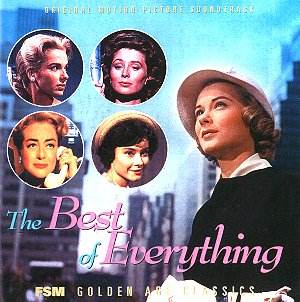Alfred NEWMAN
The Best of Everything
Conducted by the composer, September 1959; orchestrations by Earle Hagen & Herbert Spencer
Film Score Monthly Vol. 4 No.11 [Score: 48:21 * bonus tracks: 22:51 * Total: 71:12]
Available from the magazine Film Score Monthly 8503 Washington Boulevard, Culver City, CA 90232 USA; toll free: 1-888-345-6335 overseas: 310-243-9595; fax: 310-253-9588; email: info@filmscoremonthly.com.

Alfred Newman's parting work from his tenure at 20th Century-Fox is a score I've labored in vain to enjoy. This is not because the score is ineffective for its purposes in the film, which I'm sure it supports quite well. But as a listening experience, its restraint eventually produces, for me, a sense of tedium.
Made in 1959, "The Best of Everything" was a sort of big-city Peyton Place, telling the story of four young career girls working and coping in New York. Newman keeps his score tightly centered around two principal themes, one representing the city and the other a sort of multi-purpose love theme to which lyrics by Sammy Cahn were added for the opening titles. (This was back when all movie songs incorporated the film's title as a key refrain.) Interestingly, the score opens not with Newman's signature studio fanfare but with a sharp statement of the New York theme in brass. This leads quickly to the song voiced by Johnny Mathis with a velvety lushness so representative of those times.
(Other examples of what might be termed a 1950s sound, offered up in muted trombones in such cues as 'Gregg' could be another reason I have such difficulty warming to this score. Perhaps it's because I am myself a child of the '50s, but rolled piano chords, followed by swelling strings just sound so ... so dated! And the use of what must be a theremin to depict one character's developing dementia only adds to the problem.) To be fair, Newman's main theme, while hardly memorable or even catchy, has a subtly insinuating quality. I may not have come to like this score, but after a week of listening to the CD I couldn't get this theme out of my mind!
All but a handful of the CD's 23 film cues are based wholly or in part on these two themes. One exception, 'Barbara and Sidney,' written for two characters whose subplot apparently was left on the cutting room floor, contains excellent material that is never further developed. Likewise, the lovely waltz melody for 'The Corsage.' (Nor is it likely that any such material simply was jettisoned in the final cut, since this Film Score Monthly offering includes, as is typical of FSM's output, a wide range of bonus cues.)
Interestingly, the final bonus cue offered here is a mild version of Newman's classic 'Street Scene,' which apparently was used as part of "Best's" temp score. Its presence here to conclude this CD is a fitting touch by FSM, which has given us a wealth of outstanding Newman scores over the past several years. This one, however, should appeal mostly to Newman completists.
John Huether

Gary S. Dalkin says:-
The Best of Everything (1959) was a 20th Century Fox CinemaScope melodrama of the sort which used to be called a "women's picture", detailing the lives and loves of a group of women who worked in a New York office. Produced by Jerry Wald, the film followed in the tradition of his Peyton Place 91957) and The Long Hot Summer (1958) and was designed as a film to compete in length, if not scale, with the epics then in vogue. The film was scored by Fox's head of music, Alfred Newman, and was released at a more conventional 122 minutes. No music was recorded which did not appear in the finished version, yet one theme only appears once, in the cue "Barbara and Sydney", suggesting Newman composed a longer score some of which was discarded before the music ever reached the recording stage. Of greater significance, The Best of Everything proved to be Newman's final score for Fox, the composer ending his long association with the studio as the decade turned.
This is a quietly understated score, both urban and urbane. There is a title song, sung by Johnny Mathis and co-written with Sammy Cahn, which is developed throughout into romantic, sometimes nostalgic underscore and a second theme of similar character, the two so often counterbalancing each other as to be more variations than entirely separate melodies. Whether in pastoral, nostalgic mood, as in "The Kiss" or offering the cool, mellow jazz "source" cue which ironically scores "The Rape", Newman's score functions very much as backdrop. Never does it draw attention to itself, being light, dreamy and melodic.
The main score is presented in 23 cues totalling 48 minutes, and will be enough for most listeners. The stereo sound is generally excellent for the period, the characteristic Fox strings coming through bright and clear. However, there is some distortion and minor pitch fluctuation on a few tracks, though nothing to spoil anyone's enjoyment if they put the music first. There are 11 bonus cues, including mono recordings of four tracks, a demo of the title theme, and Newman's classic "Street Scene", which was used as temp music. Other cuts are source music, such as period standards "Something's Gotta Give" and "Kiss Them For Me", or else an incomplete version, i.e. missing some tracks, of "The Cafeteria".
Presented with Film Score Monthly's usual painstaking attention to detail, this is as fine a presentation of this score as is ever likely to be released. Not as much fun, and nowhere near as varied as the Newman supervised How to Marry A Millionaire (1953), this is still a notable score. It won't appeal to everyone, as this is closer to light MOR '50's jazz than the world of Herrmann and Rozsa, but those who appreciate this style of film music will not be disappointed.
Gary S. Dalkin

Return to Index